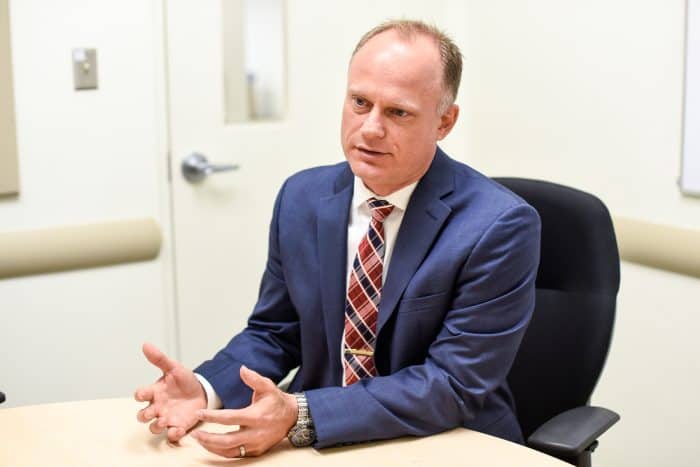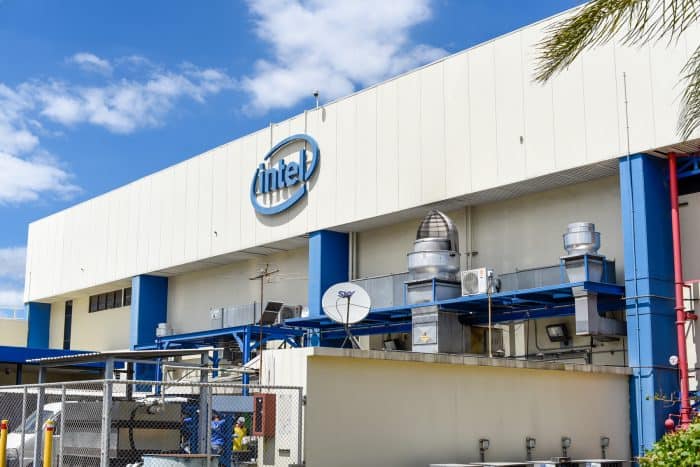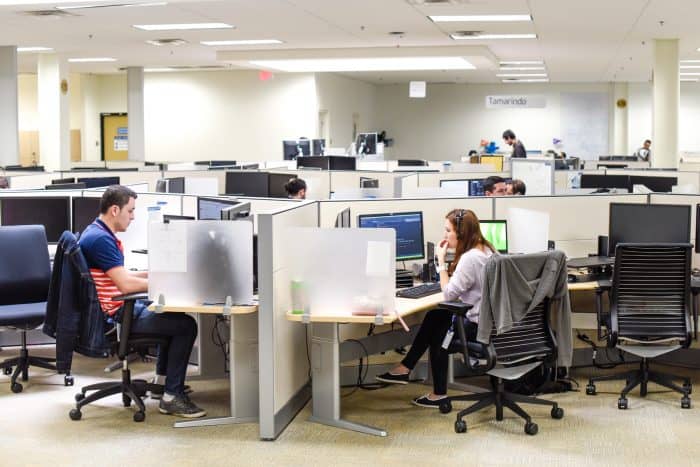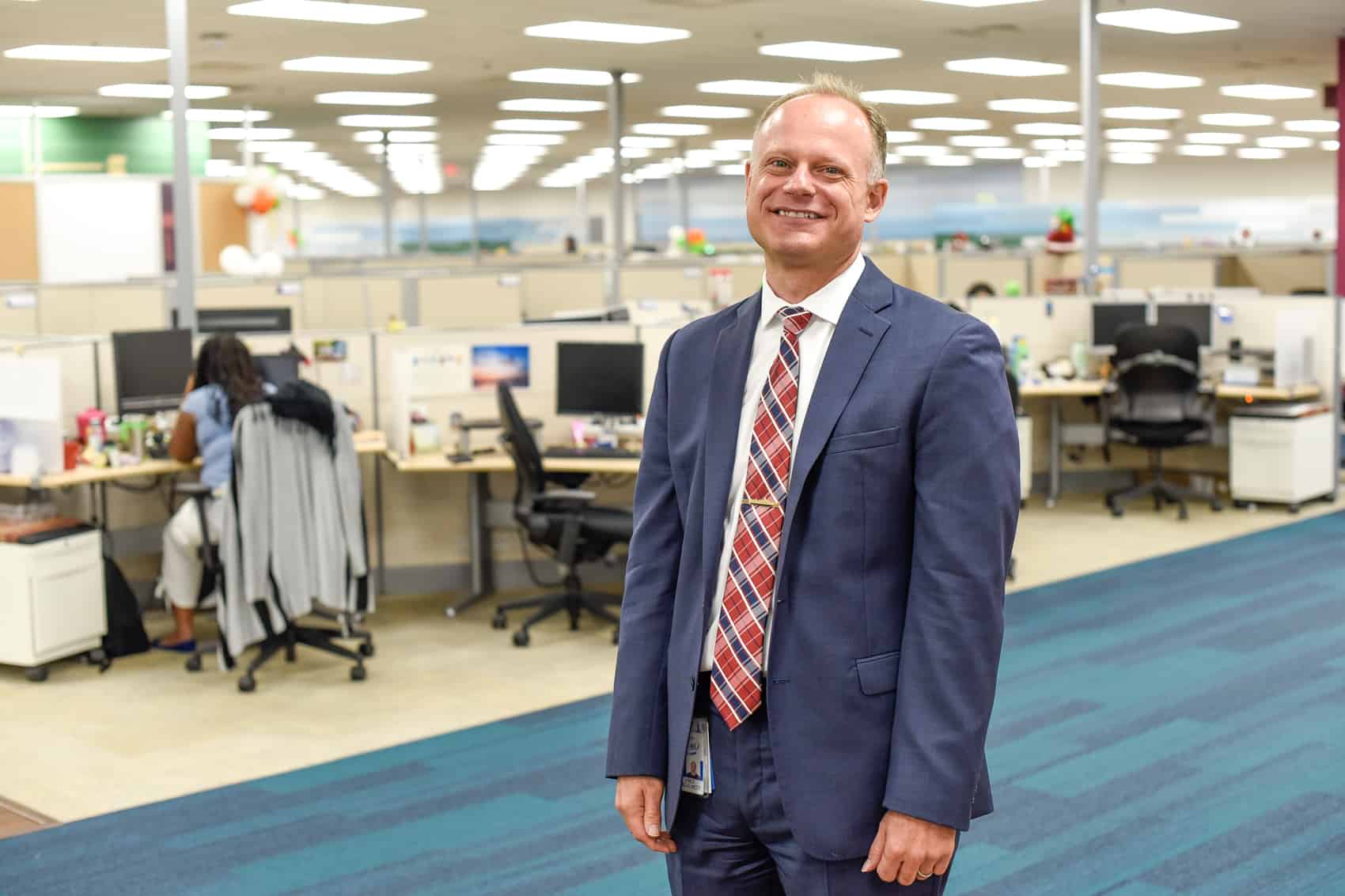Vince Guglielmetti has seen a lot of changes at Intel in his decade with the company in Costa Rica. Currently in his fifth position with the chipmaker – now chipmaker plus – the general manager of Intel’s Costa Rica operations oversees a staff of 2,000 and growing, all of them Ticos, who possess a diversity of skills unheard of at the company’s previous iteration here as a manufacturing and testing plant.
Guglielmetti says that diversity, including finance, human resources and engineering, had been developing alongside the company’s chipmaking activities in Costa Rica since it set up shop here in 1997.
“Over time all of that’s been evolving in the background,” Guglielmetti said in a recent interview with The Tico Times. “Then when the decision was made to move on from manufacturing, Intel said, ‘Well, look at the talent we already have down there, let’s continue to build the engineering skill sets.’”
When Intel announced that it was closing its silicon chip factory in Belén, Heredia, and moving it to Asia, Costa Rica’s export figures plummeted and Costa Ricans collectively said “adiós” to the U.S. company, assuming it was the end of an era.
It was. But now Intel Costa Rica is in the midst of a rebirth.
Where technicians once polished and packaged silicon chips for powering the world’s laptops, smartphones and data centers, accountants are now working on the company’s U.S. tax returns, human resources experts are processing payroll — for every single Intel employee in the Americas, including the U.S. — and engineers are testing new materials, writing code and helping solve problems faced by other Intel engineers around the world.
The company’s public affairs manager, Timothy Scott, noted that Intel changed Costa Rica’s economy when it first arrived, jump-starting a high-tech manufacturing cluster.
Now, he thinks something similar is about to happen, an upward path towards the current holy grail of economic growth: a knowledge-based economy. The evolution, Scott said, is “not just because of us but because of what Costa Rica is aiming for on research and development. That’s the new wave.”
But Costa Rica is just beginning to develop the kind of experts in the STEM fields — science, technology, engineering and mathematics — that a company like Intel needs.
“I would say the number one challenge for Intel Costa Rica right now is talent, finding the right talent,” Scott said.
The Tico Times sat down with Vince Guglielmetti and Timothy Scott to talk about Intel’s evoluation, and how the company hopes to help transform Costa Rica’s workforce.
(The interview below has been edited for clarity.)
TT: Tell me more about Intel Costa Rica’s transformation?
VG: We started with the manufacturing facility and that led to many other adjacencies. Many didn’t know we had engineering teams already. Finance and HR were already growing. (Intel Costa Rica’s HR department is now the company’s second largest globally.)
The bigger part of the transformation has been the Internet technology team here moving more and more towards software engineering skills. What we call the platform engineering teams here moved even further upstream into the silicon, where we’re actually doing the mapping of the silicon.
It’s a logical progression. We proved excellence in manufacturing, and we really love the engineering community and the talent of the people here so let’s just keep building.
Is that ‘logical progression’ something that Intel thinks about with all its sites or is that specific to Costa Rica?
It happens when you see the talent. What [Intel] found here was, ‘We’ve had excellence in this manufacturing facility, and we already have engineering teams there, how do we take advantage?’
I think it was because we had already created our diversity. Since this site had spent so much time saying, ‘We’re going for diversity, we’re going to be not just manufacturing, but engineering, global services, that led to other opportunities. I think if you’re just manufacturing, it’s more difficult [for the parent company] to say, ‘Ok, I’m going to go continue to invest.’

So there’s always been a diversity of skill sets and types of employees here, but what are the differences in skills and education between your average Intel Costa Rica employee now versus 10 years ago?
If you look at the engineering skill sets, they’re more what I’ll call electronics matched up with computer science with specific coding ability. So specific languages that they have to learn. Whereas when you’re in manufacturing, you’re very focused on real heavy tools that are actually manufacturing product. You’re interfacing with the mechanical, thermal, but it’s all right in front of you, you actually see the tool in front of you.
The new way that things happen is that now you don’t really have the tool in front of you. Now the engineers here are looking at how they’re going to connect the silicon without having a piece of silicon in front of them. They’re actually just mapping and saying, ‘All right, so how is this circuit going to connect here? What software do I have to write to make that happen?’
It’s definitely an advanced engineering skill set. That said, the engineers that were part of the factory had a lot of electronics engineering background and mechanical engineering background. So we’ve been able to transform a lot of that.
On the global services side, when finance started it was very transaction-based or transactional activity. Today that’s been moved into real analytics, so for example, here you have multiple controllers who sit on the site, and those controllers are actually reconciling Intel’s books, they’re understanding GAAP [Generally Accepted Accounting Principles], they’re understanding at the next level of complexity how to do accounting globally.
When we first started obviously that wasn’t the case, but the skill sets were strong enough and built up over time.
Is that advancement in skills mostly due to on-site training, or does it have to do with the evolution of education in Costa Rica to provide these skill sets?
I would say it’s a combination. Every corporation has a way of doing things. But really all the foundations in the finance, HR and services areas have been here in the country for a while. The country has done a really nice job building up those skill sets.
The engineering side has been a little different. There we do a lot more training to close some of the gaps because it’s something that’s still evolving in the country. The country has definitely some of the skills, and they’ve been working with us to help us to continue to close gaps, but it isn’t the same. We do a lot more of our own in-house training and working with universities.
Tell me more about working with universities to build up those skill sets.
The government and the universities have been very, very supportive. We’ve been able to bring some professors here and let them see the work that we do.
We have a very strong student population, and now we’re having some of our Intel employees going to universities to teach some of the classes.
And [the universities] have been really, really receptive to building those curriculums for us. Most of our work so far has been with the public universities but now we’re actually starting to work with private universities, as well. The partnership has been very, very good in those spaces.
We were only supposed to be 1,200 employees, and getting to 2,000, which we reached in January here, I see more and more interest in investing based on the talent here. [But] to keep up with it, you need the whole ecosystem to participate. Will you be able to get enough graduates from the public sector? You need public and private sector working together.
(Public Affairs Manager Timothy Scott noted that more than 50 percent of Costa Ricans now opt to go to private universities. “We need to work with private universities, otherwise it would be just be impossible to get the type of talent we need,” Scott said.)
What about technical schools?
When we had the factory we used a lot of [graduates from] technical schools. Many of them continued with further education. Maybe they started as technicians but they moved through and became engineers. Today we’re looking for more university-based engineering, accounting, finance backgrounds that are more professional degrees than we’ve had in the past.

I noticed you have a lot of student positions posted on your website. Are those like internships?
It’s different than what we have in the States. The students can stay here multiple years. They have a 32-hour work week. So we balance workload for them along with making sure they get to their classes. We try to make sure they’re getting an experience of what it would be like to be an engineer and the kind of work they would do. Most of them do really, really well. Assuming things go well, they fit right in very early when we start to open up full-time jobs.
What percentage of student-employees go on to get full-time positions?
In the teams that I have, that number is like 80 plus percent. We really try to make sure that if we’re going to invest that amount of time, that we get a really high percentage of that population coming on board. Especially with the growth that’s taking place on-site here right now.
I think it’s a win for both sides. They’re really getting an opportunity to see what life is like at Intel, what kind of folks you get to work with and the problems you get to solve, and we get a person who’s helping us go solve real day-to-day problems as part of our workforce. (Scott added: “You’re also getting a very good wage as you’re studying.”)
What are some other ways you’re working with universities to develop the kinds of skills Intel needs?
A few months ago we launched an external community of practice. Communities of practice have been pretty powerful for us in terms of how we close gaps on-site between [employees] we receive from the university and what we really need. And now we’re making them external.
People in the workforce right now or studying come on their own time and they learn about ‘big data.’ This is something that will accelerate and actually enhance your employment possibilities across the country because it’s an evolving skill set, not just for the country, but globally.
(Scott explained that those who join the community of practice receive classes, have homework and get an evaluation at the end of the approximately six-month program. He said Intel got more than 100 applicants for the program and whittled them down to a group of 20-25. Because of the high interest, the company plans to open another round soon. Scott stressed that participants are not obligated to work for Intel.)
How do you communicate with students and prospective employees about how they can position themselves for a job at Intel?
At the time of the closure [of the manufacturing plant] the big deal was helping everybody understand Intel really was staying. There were so many people coming to say goodbye.
And we realized it wasn’t just the site that was needing to heal, the country was needing to heal. So for most of 2014 and the first half of last year, we spent most of our time with our people here showing them that, ‘Hey, we’re actually continuing to grow.’
And then we started to do a lot more [external publicity] to let the country know what Intel was doing.
And now, from Q4 of last year until now, it’s, ‘Ok, if we want to continue to grow, this is what it’s going to take.’ We’ve been out to universities like TEC [Costa Rica Institute of Technology] and UCR [University of Costa Rica], and we’ve had them here.
We made our first trip out to the private universities in Q4 of last year. ULatina is one we’ve made some initial progress with. We’ve actually started working with their students to see if they fit, and if not, how to help them close that gap.
If you’re studying electrical engineering, the discipline you take within electrical engineering makes a big difference. In the past we could say an electrical engineer that’s going to work on equipment is very important to us.
Now, if you choose electrical engineering with a focus on communications, that’s probably not going to fit for us. But if you’re going to do electrical engineering to dive into circuit design, that is something we need you to understand. Because we need you to look at how the circuits are going to talk to each other. When you write the code, you have to know what’s going to work and what’s not going to work in the silicon.
So it’s encouraging folks that are in the engineering schools today, saying, ‘All right, if Intel is of interest to you, these are the classes we really want you to choose if it’s there, and if it’s not, then we say [to the universities], ‘Can you please build this class?’ and in the meantime we’ll have this community of practice.
What percentage of your workforce is bilingual? Do you have to speak English to get a job?
When we do interviews we do English evaluation to see if they’re going to meet the criteria. Everybody here has to be bilingual over time. Today it has to be like 95 percent bilingual, at least. (Scott added that the other 5 percent are learning.)
When we had the factory, we had more leeway because the employees on the floor didn’t have to. Now you need to be bilingual.
On the hiring side, if people have the talent, we know we can teach them English, that’s not the problem.
And we have more flexibility in our student program because the students aren’t going to be interfacing with people in the States that much – they’ll be talking to us.
We’re actually working on some pilot programs to see how quickly we can get people to next-level English.

If a competitor or another big firm that required some of the same skill sets that Intel requires decided to come to Costa Rica, would that be good for you or bad for you? Is there enough talent to go around?
Well, that’s why we’re working with the universities to try to build up the talent pool. When Intel came and did the manufacturing, a lot of other companies came, whether it was services or manufacturing.
There’s a real possibility here that another company could say, ‘Well, if Intel’s doing this down there, we should just start to show up.’
What’s happening in our finance and HR organizations, which are very mature, is that people who leave are leaders at the next [company]. On the engineering side, I don’t think the country has reached that point of maturity.
Whether it be IT engineering or platform engineering, if you have others who come and start to look for those same skills, you are going to compete for the same talent. And that’s why you need to create a bigger base: one, because we think we have the potential to grow; but we also see it from a country perspective.
It seems very logical that if you really want to grow in these sectors, you need to make it happen and others will come. And if they see they have to compete with Intel, and Intel has all the talent, they’re not going to show up.
(Scott added that building up a healthy workforce in the STEM fields will take a generation. “You have to start with at least fourth graders to let them know that they can have a future in engineering. And you teach them by playing. We need more companies talking to kids in elementary schools.”)
What do you wish was a little easier to get done in Costa Rica?
I would like, in many cases, for things to get done a bit quicker. Whether we’re working with universities or government, the pace at which you would like it to happen takes a bit longer.
For example, a curriculum doesn’t change overnight, but you want to be able to get agreement around, ‘We’re going to change a curriculum. Let’s go figure it out.’ Public universities have been receptive, but how quickly it’ll change in the network, that’s different.
Infrastructure comes up on a regular basis. That’s another one where you have to get a whole community behind something to make it happen. Lindora Road is still a country road that goes through the middle of all these major shared service centers.
It isn’t that it doesn’t get done, it’s just how much time it takes to make stuff happen.
Further reading:
Intel to open new ‘mega-lab’ and hire 350 more Ticos
Intel expands Costa Rica operations
Op-ed: Intel transforms 1,500 blue-collar jobs into 2,000+ white-collar positions





